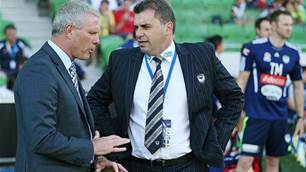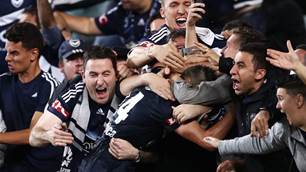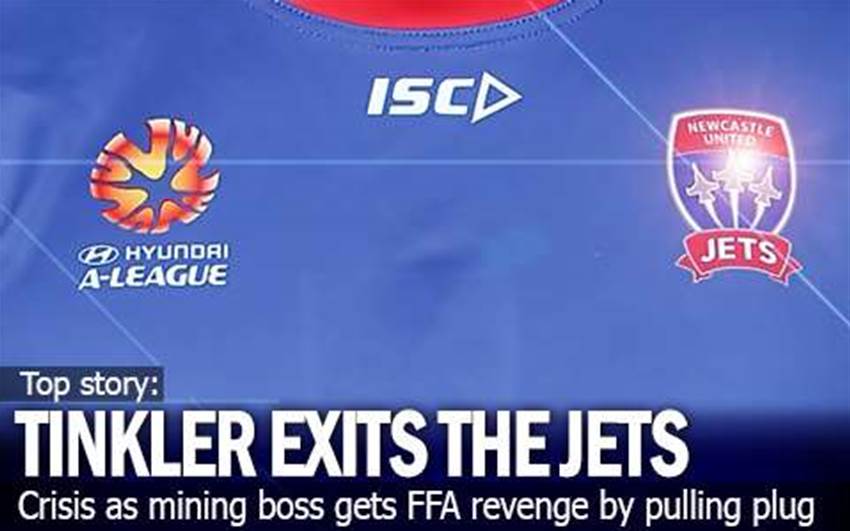THE A-LEAGUE was plunged into new crisis today as mining magnate Nathan Tinkler announced he was walking away from Newcastle Jets over his row with the FFA.
Tinkler discovered earlier this year that he had been charged way more for his licence by the FFA than other A-League club owners had paid for theirs.
The FFA justified the deal - said to be worth $5 million - by insisting the price was the market value for an established club, and not the same as $1 million charged for start-up clubs.
However it's believed the FFA changed considerably less when Adelaide United and Brisbane Roar were taken over by new owners from the the FFA.
Today Tinkler - a close business friend of former Gold Coast United Clive Palmer - confirmed his Hunter Sports Group were pulling the plug on Newcastle Jets.
The announcement came on the day the FFA hold their glamorous black tie A-League Awards ceremony in Sydney and will shift media focus onto the Jets crisis instead of the star-studded event.
But the HSG insisted they were not walking out on football in the area, just on their deal with the FFA.
"It is about removing ourselves from an organisation in which we have an untenable relationship through an irrevocable breakdown in confidence of the current FFA management," said HSG's CEO Troy Palmer.
The HSG today said the group had invested almost $12 million since stepping in at short notice to save the ailing club less than 18 months ago.
Since then they have clashed the FFA over a range of issues including the $5 million fee, marquee star Jason Culina's insurance - which cost father and coach Branko Culina his job on the day of the A-League's season launch - and the competition’s financial model which they branded "unsustainable".
"These frustrations have been highlighted with the FFA’s own report identifying combined club losses in excess of $27 million for the 2012 financial year," said the club today. "Projections of similar losses are forecast for next year."
The Jets had won over many new fans in the wake of the Tinkler revolution on the Hunter which also saw him take control of local NRL team Newcastle Knights.
Cheaper tickets and better ommunity involvement rewarded the side with increased crowd numbers and memberships this season.
"The decision to return the club license was made more difficult because of a community model highly regarded by many as a leader in the A-League that features industry best practices," said the club today.
But the Jets relationship with the FFA soured publicly after Palmer was forced out of Gold Coast United earlier this year and Palmer aired their dirty linen on TV.
CEO Troy Palmer said this was a difficult decision but one forced upon the HSG through an irrevocable breakdown in confidence of the current FFA management and its refusal to provide clear and transparent answers about the Jets acquisition fee and a variety of other issues.
“As a keen Jets and football fan this has been a tough decision and I am aware the impact this will have on members, players, coaches, fans and the entire football community,” Palmer said.
“I am particularly saddened for members and supporters who have embraced our community model, which has been accepted in so many areas as a successful and unique way to engage the entire community and build the A-League brand.
“It is also frustrating to have invested so much time, energy and money to save the Jets for the community at short notice and then continually hit road blocks at the FFA.
“It should never be forgotten that when we stepped in to save the club it was insolvent, there were only 500 members, diminishing crowds, minimal community engagement, no merchandise programme and negligible corporate support.
“During the 2011/12 season we believe we turned this around to be seen as leaders in all these areas.
“Unfortunately, having lost confidence in the FFA management and its ability to find a resolution, it is clear we have no other option.
“It is about removing ourselves from an administration in which we have an untenable relationship.”
A critical factor for the Hunter Sports Group has been the impasse and an inability to have clear communication to discuss the club’s controversial acquisition fee, they said.
"We have attempted to organise meetings with the FFA to discuss our $5 million acquisition fee, with our only condition being we must be advised what other clubs have paid, if anything, why acquisition fees vary, how much of a success fee was paid to the FFA's agent and how the money was used,” Palmer said.
“Having rejected our terms on every occasion we had no confidence a consistent and rational explanation for the fee would be forthcoming, particularly after inflammatory media comments from the FFA.”
The decision made by HSG was taken after much consideration to the impact on the game, general consultation and formal discussion with key stakeholders.
To ensure continued support of football in the Hunter region, the HSG will invest in a high performance academy to develop young players and provide a pathway to showcase their abilities and maximise their talent and potential.
Under the revised strategy of the HSG, $1 million will be invested annually to encourage local children to play football and propagate the game in the region.
“This decision by the Hunter Sports Group is not about walking away from football and we will continue to meet and grow our local commitments,” Palmer said.
"We will now invest in local junior talent and help reduce the burden on their families. We would rather proactively support youth and our local community at the expense of the huge wastage in the A-League.”
Related Articles

Kiwi legend: A-League can seize the day post-COVID-19

Backlash over Fox Sports new season launch













